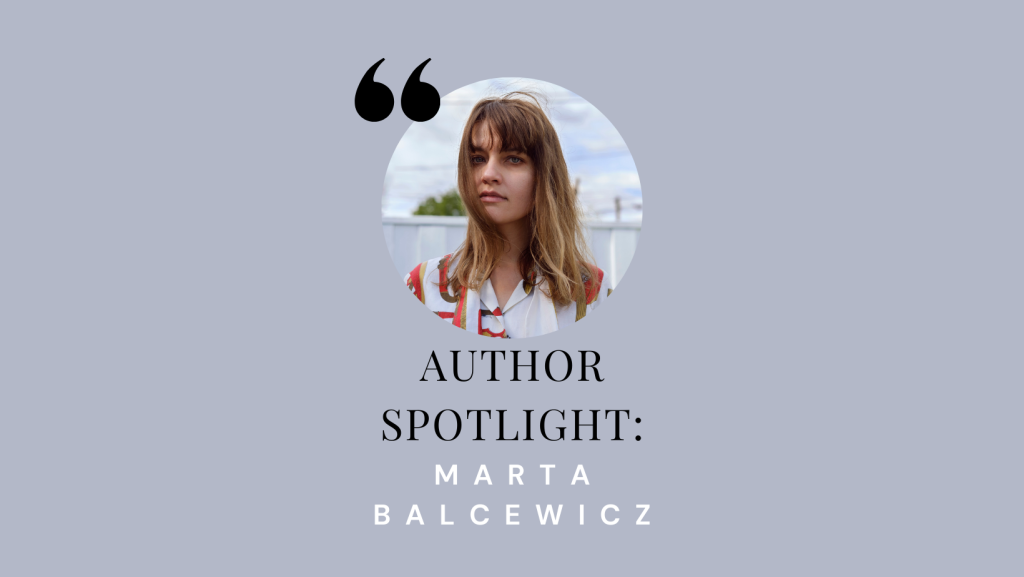20th Anniversary Spotlight: Marta Balcewicz

Our 20th-anniversary celebrations continue with another Author Spotlight interview. Today, we’re shining a light on Marta Balcewicz. We recently had the pleasure of publishing Marta’s debut novel Big Shadow. Marta was a writer who we had been keeping tabs on through her early publications in literary magazine, and one day we were lucky enough to be put in touch with her agent to discuss a manuscript she had recently completed. This led to Big Shadow being dropped on our laps, and wow, what a book! Upon reading it we knew we had to put it out into the world. One of our favourite parts of running the press is getting to publish new voices, and working with Marta was a constant reminder of what a privilege that is!
In our Q&A with Marta, she shares what it means to be part of the Book*hug author family, highlights a title by fellow Book*hug author Emily Anglin, that has left a lasting impression on her, and reflects on indie vs major publishing houses! Happy reading!
B*: What does being part of the Book*hug Press author family mean to you? Please share an anecdote, reflection, or backstory about your publishing experience?
Independent publishers (and indie record labels and indie filmmakers) are the underpinning of culture. I feel lucky that I grew up at a time when young people were particularly conscious of that (or maybe I’m just idealizing my youth), and that I appreciated how independent art inspired my own creative drive and confidence in what I made. Publishing my novel with Book*hug confirmed all and any ideas I’d had about independent art production. As a writer, I felt a sense of acceptance and respect for my art from Book*hug’s publishers, Jay and Hazel. There was also the sense that genuine, very careful care was being put into all aspects of my book’s coming to life: editing, design, promotion. Things felt cozy; I felt taken care of. We live in a world where things are so often slapped together in an expedient way, corners are cut, tasks are phoned in. The experience of publishing my novel was the opposite of that–and when what’s at stake is your artwork, it means everything that it is given this careful, devoted, individualized treatment. Ultimately that’s the descriptor I’d use for what it feels like to be part of the Book*hug author family: being part of a press that puts genuine care into the art it puts out into the world.
B*: Can you share another title from the Book*hug Press catalogue that has left a lasting impression on you as a reader? Tell us about a book that has been a touchstone for you, one that you found meaningful, interesting, or simply loved.
I’m a regular reader of Book*hug’s catalogue and it’s hard to limit myself to one title. I love that Book*hug is devoted to publishing translations, more than any other press in Canada (Olga Ravn’s most recent, My Work, blew my mind). But if I had to truly limit myself to one title, it would be Emily Anglin’s The Third Person, a short story collection that is so cool and so haunting that I find myself religiously telling anyone who will listen about it. In my humble opinion, it’s way up there, as one of the best Canadian short story collections ever published.
When we see more large publisher consolidations and huge conglomerates dominating the marketplace, what does it mean to you to be published by an independent publisher like Book*hug Press?
This goes back to my first answer, and how on a personal level, putting out work with an independent publisher feels right, considering that the art I was shaped by was independently produced and the art I call my favourite art is independently produced. I remember the first time I understood that independent presses exist, which happened after I already knew that indie record labels existed and that certain filmmakers did not put their films out with the Hollywood studios, and that, for the most part, I liked those independent bands and those independent filmmakers more. As a teenager, I liked going to Pages bookstore in Toronto (now shuttered), across from the Much Music building. Because Pages was a cool indie shop that carried a lot of independent presses, I eventually realized that these logos on spines with office addresses not in New York or London were the book equivalent of indie record labels. I was a bookworm, so this realization was very exciting. It made sense that the more creative and exciting stuff I would pick up would come from indie presses. What a sad world it would be if there was no independent production of books. A society full of mega-corporations is a scary place–we all know that, I hope.

